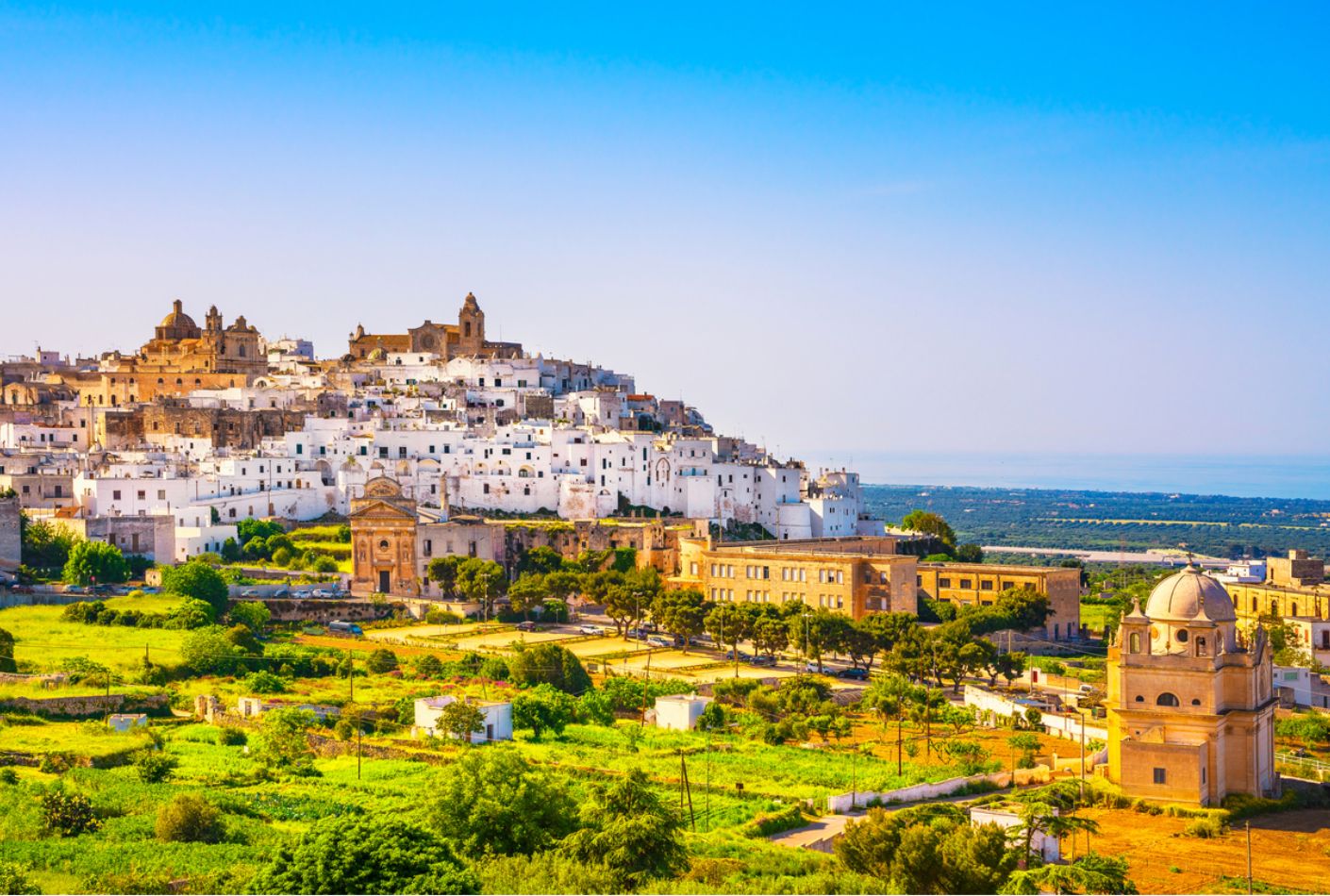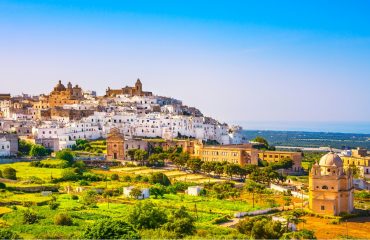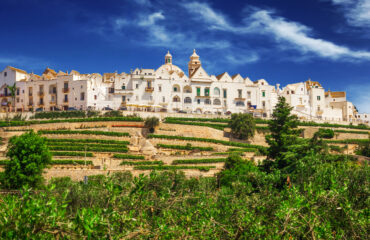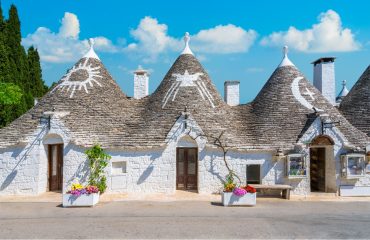NOTHING LIKE PUGLIA
Day trip to an olive oil farm, Ostuni, Locorotondo & Alberobello
- Dip a finger into Apulia’s centuries-old olive oil making tradition on a visit to a historic farm
- Step into Ostuni’s picture postcard beauty and weave your way along its shimmering white streets
- Discover how a 15th century tax fraud eventually led to the creation of a World Heritage Site as you admire Alberobello’s iconic trulli
-
Category
-
Hobbies & Interests
-
DurationFull day
-
Destination
NOTHING LIKE PUGLIA
Day trip to an olive oil farm, Ostuni, Locorotondo & Alberobello
Explore three of Apulia’s favourite towns and find out more about the region’s centuries-old olive oil making tradition on this full-day excursion to the Itria Valley.
In the morning your private guide and chauffeur will meet you at your accommodation and drive you to a farm whose pride is the production of top class olive oil. Upon arrival a member of staff will greet you and give you an introduction to the activities carried out on the estate, owned by a local family, now on the sixth generation of dedicated olive oil makers. However, the estate’s origins date way further back in time, as attested by the fascinating traces of ancient civilizations, which have, surprisingly, survived to this day almost intact. As you will discover on a tour of the farm, here it is possible to retrace the history and development of country life and the tradition of olive oil making from the Roman period right up to modern times. While you wander through the olive grove your host will tell you about the centuries-old – and on occasions even thousand-year-old! – trees and how, despite their age, they still thrive in this sun-blessed Mediterranean haven. Your tour will then continue with a visit to the impressive remains of a Roman era hypogeal mill, a medieval dwelling, barn and stables, a 17th century farmer’s house, an 18th century church, shepherds’ home and furnace and a mill from the 1800s now used as a small but intriguing museum dedicated to peasant culture. This is a truly remarkable real life encyclopaedia of farming through the ages. A sampling of locally produced extra virgin olive oil will allow you to savour the results of Apulia’s millenary tradition.
A short drive will then bring you to the hilltop town of Ostuni. Bright chalky buildings line an intricate maze of twisting alleys and steep stairways, surrounded by the seemingly endless plains of olive groves. Scattered here and there painted wooden doors and pots of blooming geraniums lend additional splashes of vivid green, brilliant crimson and bright pink to the scene. Wonderful views of the countryside stretching all the way to the sapphire waters of the Adriatic Sea can be glimpsed between the houses. The 15th century Cathedral of Santa Maria Assunta, with its elegantly shaped facade, elaborate rose windows and splendid Gothic portals, proudly surveys the “White Dame” – as Ostuni is called – from the town’s summit.
Ostuni is a sheer delight and a must-see for anyone visiting Apulia. The town’s most distinctive trait is its whitewashed houses, gleaming in the dazzling light of the southern sun. The practice of lime washing became popular in the 18th century when a devastating plague struck the region. Locals noticed that the illness spread less easily in places where the houses were white and attributed this fact to a miracle, which we now know is probably due to the antibacterial effect of the calcium carbonate. The lime protected the town and, over the centuries, became the symbol of Ostuni and the very reason for the long-lasting fame of this Adriatic pearl. Your guide will lead you on a trail through narrow streets, up and down steps, across charming piazzette, allowing you to get to know the layout of Ostuni’s medieval neighbourhood and its most famous attractions.
After some free time for lunch rejoin your driver and reach your next destination. Perched on a hill in a panoramic position at the heart of the Itria Valley, pretty Locorotondo offers sweeping views of the surrounding landscape from its belvedere: a mosaic of vineyards enclosed by dry stone walls, silvery olive groves enveloping old farms, hundreds of trulli peppering the green fields. Founded in 1000 AD, the town derives its name from the Latin words locus rotundus literally meaning “round place”, owing to the circular plan of its historic centre. Narrow concentric streets flanked by traditional cummerse houses with unusual pitched roofs are a typical feature of this quaint little town. Follow your guide on a walk through Locorotondo, pausing to admire its graceful palazzi and churches. Every year since 2008 the citizens have participated in a competition called Balconi Fioriti, which encourages residents of Locorotondo to adorn their balconies and front doors with flowering pots, thus adding to the town’s homely allure. Locorotondo is best-known as the region’s wine-producing capital so don’t forget to drop in at a local enoteca and request a glass of the local DOC designated white wine.
The last stop on your excursion will bring you to the picture-postcard town of Alberobello, world-famous for its iconic trulli houses. Here you will discover how an ingeniously devised tax fraud curiously led to the creation of a UNESCO World Heritage Site. Trulli are whitewashed dwellings consisting of thick dry-stone walls assembled without mortar and topped by conical stone roofs. Bizarre as it may seem, these houses were originally designed in the late 15th century with the aim of fooling royal authorities and avoiding taxation, a successful trick that worked right up till 1797 when Alberobello acquired its status as a proper town. Indeed, until then, the local feudal lords, the shrewd Counts of Acquaviva, obliged their subjects to live inside trulli which could be quickly and easily dismantled. Taxation applied only to populated settlements and Alberobello could be transformed in no time into a vast expanse of rubble if the royal officers decided to inspect. Today these structures are still inhabited and constitute “an outstanding example of human settlement that retains its original form to a remarkable extent” as stated by the UNESCO committee. They also live on as a reminder of characteristic Italian artfulness. Enjoy a leisurely stroll along the town’s winding alleys lined with shops selling hand-painted ceramic artefacts, gastronomic specialities and all sorts of trulli-shaped souvenirs, before returning to your accommodation.
- A Mercedes vehicle and professional driver at your disposal for a full-day excursion to an olive oil farm, Ostuni, Locorotondo and Alberobello
- A full-day private tour with an expert licensed guide
- A visit to an olive oil farm with olive oil tasting
- Tips
- Meals
- The order of the sites visited may change






